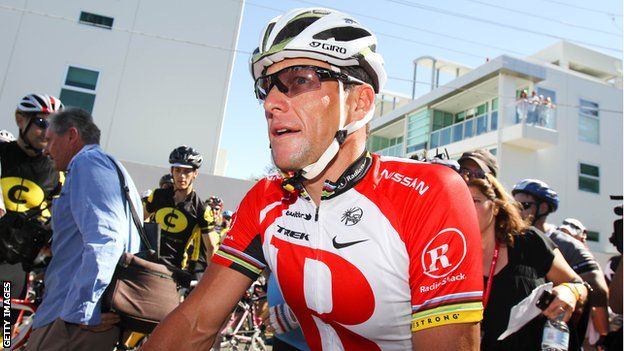Lance Armstrong's appeal deadline for USADA charges extended
- Published

Lance Armstrong
Lance Armstrong's deadline to appeal against charges from the United States Anti-Doping Agency has been extended.
The seven-time Tour de France winner was charged last month with using performance-enhancing drugs, and had until Saturday to contest or accept sanctions.
However, that deadline has now been extended by 30 days.
Armstrong, who could lose his Tour titles and faces a lifetime ban, denies the charges.
"This extension will allow the court sufficient time to evaluate Mr Armstrong's amended complaint," read a statement from Tim Herman, counsel to Armstrong.
The 40-year-old's initial 80-page complaint was thrown out on Monday, but he has submitted a shorter, 25-page suit asking a federal judge in Austin to prevent the case from going forward.
Three of the six men named in the doping conspiracy case were given lifetime bans on Tuesday.
Doctors Luis Garcia del Moral and Michele Ferrari, plus trainer Jose "Pepe" Marti, from the rider's US Postal Service team failed to answer charges before the USADA's deadline and were promptly banned.
Armstrong's latest lawsuit argues:
That the USADA violates athletes' constitutional rights
That the agency doesn't have the jurisdiction to bring the charges
That it may have violated federal law in its investigation
US District Judge Sam Sparks said the original lawsuit seemed more of an attempt to win over public opinion than to focus on legal argument.
"This court is not inclined to indulge Armstrong's desire for publicity … by sifting through 80 mostly unnecessary pages [for] factual material relevant to his claims," Sparks wrote on Monday.
USADA charged Armstrong with doping last month and claimed 10 of his former team-mates will testify against him.
Armstrong, who dominated the Tour de France between 1999 and 2005, has never tested positive and says he has taken more than 500 drug tests in his career.
In his original submission, he accused USADA, its chief executive Travis Tygart and FBI agent Jeff Novitzky of waging a personal vendetta.
Armstrong has already urged USADA's review board to dismiss allegations brought against him, claiming they are "stale allegations disproved long ago and short on evidence".
His legal team argue their client is unable to mount a legitimate defence until he is able to see the evidence against him, although USADA has said it is withholding witnesses' identities to protect them from intimidation.
Armstrong, who survived testicular cancer prior to his record-breaking Tour wins, retired after the 2005 race, but made a comeback in 2009. He retired for a second time in February 2011, taking up the triathlon.
- Published10 July 2012
- Published4 February 2012